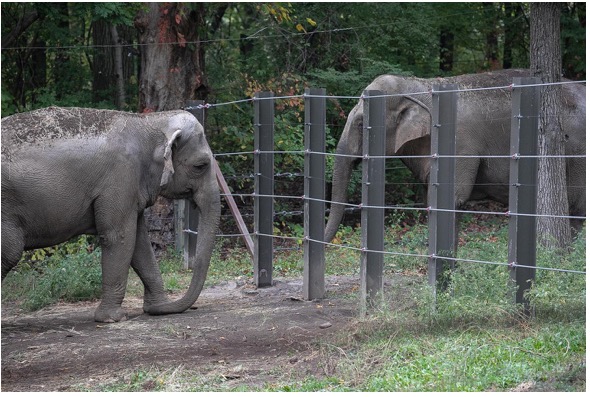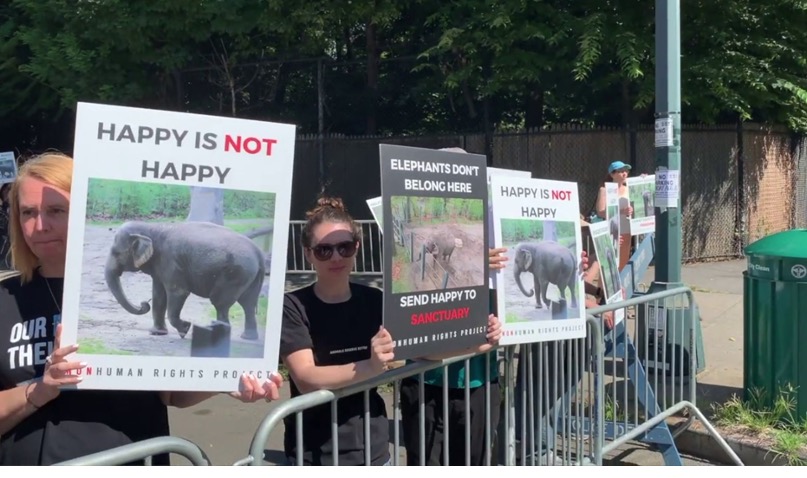CommentsANIMAL WATCH - The argument by the Nonhuman Rights Project that an elephant, named Happy, is being illegally detained at the Bronx Zoo in a case about the rights and “personhood” of highly intelligent animals, has been rejected, the New York Times reports.
Happy has been at the Bronx Zoo for more than 40 years and will remain there after New York’s highest court ruled that she is not a person, in a legal sense.
In the important 5-to-2 vote on June 14, 2022, the Court of Appeals in New York denied the Nonhuman Rights Project’s argument that Happy should be transferred to a more natural environment.
The dispute hinged on whether the cornerstone legal principle of habeas corpus—which people assert to protect their bodily liberty and to contest illegal confinement—should be extended to autonomous, cognitively complex animals like elephants.
The court said, “No.”
“While no one disputes the impressive capabilities of elephants, we reject petitioner’s arguments that it is entitled to seek the remedy of habeas corpus on Happy’s behalf,” wrote Janet DiFiore, the chief judge. “Habeas corpus is a procedural vehicle intended to secure the liberty rights of human beings who are unlawfully restrained, not nonhuman animals.”
The report states that this ruling “ended what appears to be the first case of its kind in the English-speaking world to reach so high a court,” but is unlikely to end the debate over whether highly intelligent animals should be viewed as other than “things or property.”
This is just one of the costly cases to taxpayers in a continuing legal effort by the Nonhuman Rights Project—a non-profit organization—to free (or relocate from one confinement to another) captive animals.
Last month, the group stated it also filed a habeas claim seeking to have three elephants removed from a Fresno, CA, zoo, the NY Times reports.
Since there seems to be no assertion by the NhRP that Happy is lacking care or attention, at the heart of the dispute must also be concern for the outcome for the animals they claim to represent. If the Nonhuman Animal Project is later successful, would these animals that have spent their lives in captivity just to be released to the “wild” after a lifetime of attention and without prescribed diets, veterinary care and protections?
This would, of course, be different if the animals represented were in dangerous or negligent situations. It could also then fall under criminal animal-abuse laws. But, if granted “personhood,” will these animals lose that right?
Happy was reportedly born in the early 1970’s, probably in Thailand, and was captured at a very young age and brought to the U.S. at that time to be part of a petting zoo. The Bronx Zoo reportedly acquired her and another of the seven, also a female, in 1977 (possibly a “rescue”).
NY Times columnist Ed Shanahan reported his observation when he visited the Bronx Zoo in May and stated he watched Happy interacting with another Asian elephant, Patty, in an area he described as “…separated by a fence in the roughly two-acre, tree-lined enclosure they share, with logs scattered around and a pool nearby.” The zoo contends that the two elephants can touch trunks and communicate safely, despite the fencing barrier, he remarked.

“Both of our elephants look great,” a tour guide told him. Shanahan commented that the guide’s assessment “… could be hard for the average person to contradict.”
In 2006, a young female elephant, Sammy, was brought in to be Happy’s new companion, but she died soon after arriving.
The zoo decided against adding any more elephants, “focusing instead on helping endangered members of the species in the wild,” a report at that time states.
However, the Non-human Rights group calls the zoo, a “prison” for Happy, and requested to relocate her to an elephant sanctuary, which it insisted is a more natural setting and would improve her quality of life.
In an interview prior to the decision, Non-Human Rights group founder, Steven Wise, reportedly stated, “She’s a really a depressed, screwed-up elephant.”
The Wildlife Conservation Society, which operates the zoo disagrees and contends that Happy is “well cared for by professionals with decades of experience and with whom she is strongly bonded,” and commented in a statement made before the ruling, that the case amounted to “blatant exploitation.”
THE FUTURE AND DANGERS OF “ANIMAL RIGHTS”
In February 2020, the Bronx State Supreme Court rejected a habeas petition filed on Happy’s behalf by Mr. Wise’s group, but the Bronx State Supreme Court judge wrote, “This court agrees that Happy is more than just a legal thing, or property.” That was the basis for the recent Court of Appeals hearing. (In New York the “Supreme Court” is the lower, trial court.)
The meaning of “bodily liberty” and the potentially larger effects such a decision could have on other animals in the future, if there were a ruling that would move Happy from the zoo, were key in this instance.
One judge candidly asked the question which must be foremost in most human minds, which is the future ramifications on the ownership of pets. She questioned whether it would have an effect on keeping a dog—stating: “Dogs can memorize words,” alluding to their intelligence.
The attorney for Non-Human Rights Project responded, “No, we don’t have the evidence about dogs that we have about elephants right now,” the NY Times report states. (Emph. added.)
In her opinion, Judge DiFiore agreed that a decision in favor of Mr. Wise’s group, “would have an enormous destabilizing impact on modern society.”
ANIMAL “PERSONHOOD” IS THE GOAL
The Nonhuman Rights Project (NhRP) states that it “is an American nonprofit animal rights organization seeking to change the legal status of at least some animals from that of property to that of persons….” (Read more here.)
It's unlikely to be a quick and easy fight, but Wise says he accepts that he's in the animal-personhood game for the long haul. “This is a long-term, strategic, open-ended campaign,” he states.
There also seems to be some competition to be the first to have the acceptance of “animal rights” printed into law.
RISKS FOR ANIMALS
While most animal lovers cringe at the thought of laboratory experiments, slaughterhouses, or inhumane captivity of wild animals, the U.S. has strong anti-cruelty laws that can be invoked. But, is society—and our legal system--ready to make the giant leap into the unknown that could leave the animals achieving “personhood” vulnerable and falling through the cracks in laws without any viable and enforceable protections?
Two examples of this are Pit Bull dog fighting, in which “dog men” (those who own fighting Pit Bulls or are aficionados of the sport) claim it is the innate instinct of this breed to fight to victory or death and that combat is natural to them, in the same way as human MMA fighters and boxers “have it in their blood.”

But current animal-cruelty laws disagree and contend that animals are exploited for gambling and other gains; whereas, human combat sports are legal. On which side of this argument will nonhuman animals with personhood fall?
THE “NON-HUMAN ANIMAL RIGHTS” MOVEMENT IN THE COURTS
This is just one of the costly cases to taxpayers in a continuing legal effort by the Nonhuman Rights group to achieve human rights for animals, without thinking through the potential consequences.
Last month, the group stated it also filed a habeas claim seeking to have three elephants removed from a Fresno, Calif., zoo, the NY Times reports.
Animals are voiceless and often suffer in silence, but at least, if someone will take the time and effort to call for help, there are animal-control agencies, humane societies and police/sheriff’s officers to respond and laws that allow penalties from impoundment and rescission of ownership, to prison terms.
However, in gaining “personhood” what is being lost?
CA ASSEMBLY CANDIDATE SPONSORING “ANIMAL BILL OF RIGHTS”
Whether or not it is part of the Non-Human Rights Project effort, a current candidate for Assembly District No. 72 in Orange County, Judie Mancuso, has—through current Assemblyman Miguel Santiago—sponsored a proposed Animal Bill of Rights that has made its way through the California Assembly Committees, while being constantly rewritten, and will have its final hearing before the Senate Judiciary Committee on June 24, 2022.
Mancuso is also the President of a 501(c)(4) organization called “Social Compassion in Legislation.” A 501(c)(4) is a non-tax-deductible social welfare group that can advocate for causes and propositions and also endorse specific candidates.

ABSTRACT OF ORIGINAL PROPOSED “BILL OF RIGHTS”
Here is the abstract of the original AB 1881 wording:
Existing law makes it a crime for the owner or keeper of any animal to permit an animal to be in any enclosure without proper care and attention, or to abuse or neglect an animal, as specified.
This bill would enact the Dog and Cat Bill of Rights, and would require every public animal control agency or shelter, society for the prevention of cruelty to animals shelter, humane society shelter, or rescue group in the state to make a copy of the notice, as specified, available through at least one of the methods specified, including, among others, that the notice is posted on the facility's website in a clear and conspicuous manner. The bill would impose a civil penalty for failure to post the notice, as specified. The bill would make legislative findings and declarations in support of the Dog and Cat Bill of Rights. The bill would also authorize the Attorney General, district attorney, or city attorney to bring a civil action to enforce the violation.
Read entire bill here along with analysis.
OPPOSITION – American Kennel Club (AKC), Ca Veterinary Medical Association (CVMA) And Animal Health Institute (AHI) opposed AB 1881
The combined opposition of these groups was made in a public statement on April 19, 2022, opposing proposed AB 1881 (also known as the “Dog and Cat Bill of Rights)” and through a letter sent to California State Representative Miguel Santiago, the bill's author, and the Assembly Business and Professions Committee, the AKC, CVMA, and AHI, which states (in part):
AKC LEGISLATIVE ALERT RE JUNE 28 SENATE JUDICIARY HEARING:
AB 1881 – “Dog and Cat Welfare” (formerly the “Dog and Cat Bill of Rights”)
As previously reported, this bill was significantly amended in a previous committee to address AKC’s primary concerns. While it is still being referenced as the Dog and Cat Bill of Rights, the actual chapter created by the bill is now simply called “Dog and Cat Welfare”, and all references to “rights”, “guardian”, and other terms of concern have been removed.
HUMANE SOCIETY OF THE U.S. (HSUS) AND CALIFORNIA ANIMAL WELFARE ASSOCIATION (CAWA) RESPOND TO AB 1881
Following are some of the issues included in their concerns and objection:
“This bill does not solve a problem. The sponsor of this bill thinks that “bad” people are adopting animals from shelters, behaving irresponsibly, and then returning them. There is no data to support this. In fact, adoption returns are down.”
“The sponsors of this bill allege that our sheltering professionals are not properly counseling or communicating with adopters about the expectations to provide quality care. As a result, the state must step in and provide us with a notice to post in our facilities.”
“Our shelters are staffed by trained professionals and dedicated volunteers that work each and every day to help animals in need. They work with adopters to help them select the right pet, provide counseling to help ensure a smooth transition to the new home, and provide ongoing support.”
“When pets are returned to the shelter, it is usually because the pet is not the right match, or the adopter is experiencing some unexpected financial or housing hardship. People should not be shamed for having to make the difficult decision to return a pet.”
AB 1881 DOES NOT SOLVE ANY PROBLEMS
Several Senators expressed the concern that AB 1881 is “a bill looking for a problem.”
In addition to the faulty and burdensome wording and the apparent unfunded mandate it creates (because shelters have no way to recover the cost of creating the required posting), it also does not address any need for advisories regarding the care and needs of animals from breeders, or advertised on Craigslist or any of the internet locations selling/giving away pets.
Animal shelters and humane societies have the safety and permanent retention of animals at the heart of their everyday activities and are professionals. Why do they need the legislature telling them how to counsel adopters?
It truly does appear the Animal Bill of Rights (now “Animal Welfare” bill) is a proposed solution looking for a problem, and it also is looking very much like a ploy by a political candidate.
This serious and senseless assault on the animal shelters and humane societies of California is unnecessary, costly, time-consuming, insulting and, hopefully, will be rejected by California’s lawmakers so we can get on with the real problems facing our state and our animals.
The bestowing of human rights on animals and the unintended consequences of this “Animal Rights” bill could have far-reaching and very detrimental effects on all.
(Phyllis M. Daugherty is a contributor to CityWatch and a former Los Angeles City employee.)





